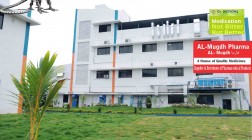Tyco Security eyes Indian hospitals be tagged with RFID & RLTS Elpas location based tracking solutions
 Tyco Security is on an aggressive mode to tap the Indian healthcare space to provide advanced Elpas Location Based Tracking solutions to trace not just people but medical assets.
Tyco Security is on an aggressive mode to tap the Indian healthcare space to provide advanced Elpas Location Based Tracking solutions to trace not just people but medical assets.
Elpas is a brand of Tyco Security Products known for location-based tracking and intrusion solutions in the security industry. In fact Tyco’s portfolio is one of the largest security portfolios globally covering Triple Technology Active RFID (Radio Frequency Identification), Real-time Location Systems (RTLS) Passive RFID, and Physical Access safety, security and visibility products and solutions. These include Elpas Patient Flow, Elpas Infant Protection, Staff Duress Call, Nurse Call Integration, Asset Management, Elopement Prevention, Temperature Monitoring and Elpas Hand Hygiene.
“We are known for our trusted brands in access control, video, intrusion detection and real time location -based tracking which are relevant to both private and government hospitals. In fact, in government hospitals it is most useful for crowd management, ensuring effective use of scarce medical assets and staff besides prevent crime such as infant snatching, said Rajeev Samanta, regional sales director-South Asia, Tyco Security Products.
The concept of location-based tracking of assets and staff is new to healthcare facilities in India. It will certainly take some time for the concept to gain traction. But, from the interest shown by potential users, there is a clear market that will emerge particularly in premium hospitals and nursing homes. There is low cost competition for Elpas in India which poses reliability issues. However, Elpas comes with the promise of being an internationally field proven brand with robust and reliable technology, he added.
Modern healthcare facilities brim with patients, staff, visitors and medical assets spread across multiple buildings. In such a scenario it is important to secure the most sensitive areas such as pediatrics, geriatrics and psychiatric units, restricted areas like the labs, operating rooms, R&D, medical records room, radiology and expensive machinery and diagnostic equipment like portable X- Ray machines, blood analyzers, ventilators and more.
In order to maximise productivity, reduce costs and improve patient care, the real-time identification and location of doctors, nurses, medical equipment and other assets is mission critical, he said.
In-patients are provided an Elpas Patient Tag which transmits real-time location visibility, monitors moving through the different stages of care delivery, freeing staff from time consuming manual record keeping. Hospital personnel are provided with automated time stamped dashboard-like snapshots of the current care status of each patient, graphically overlaid onto the relevant floor plan from time of admission until discharge. This information can also be displayed on electronic boards in waiting rooms updating family and friends as to the progress of a patient’s treatment, he said.
Additionally, to facilitate better task coordination, automated alerts can also be sent to medical staff allowing them to check on patients waiting for treatment, to update room status, to transfer patients or to issue housekeeping requests.
Elpas Infant Protection helps hospitals prevent baby abductions and unintentional baby mismatching in maternity environments. At the time of birth the infant is issued an Infant Protection Bracelet, which is placed on the baby’s ankle and later can be adjusted should the baby lose weight before discharge. Should an attempt occur to move the protected infant from the secured area without approval, the Bracelet will trigger the system to alert personnel of the occurring security threat.










